The benefits of chatbots for businesses are well documented. These robot sidekicks do wonders for customer service, sales, and brand loyalty. And they’re just getting started.
The size of the chatbot market worldwide is expected to hit a whopping $1.25 billion in 2025. And Gartner predicts that they’re going to be a primary customer service aid for 25% of organizations not long after that.
Haven’t jumped on the chatbot bandwagon yet? Or still on the fence about their awesomeness? Here are 12 chatbot benefits that we hope will change your mind.
Bonus: Learn how to sell more products on social media with our free Social Commerce 101 guide. Delight your customers and improve conversion rates.
12 benefits of chatbots for businesses
Chatbot advantages vary depending on the type you use and how you deploy them. There are three types of chatbots that you should know:
- Smart chatbots that use artificial intelligence (AI)
- Simple, rule-based chatbots
- Hybrid models that use a mix of both
Not all chatbots can do everything. If you’re looking for an unbeatable sidekick—the Robin to your Batman—then we recommend an AI chatbot like Heyday.
This list looks primarily at the benefits of AI chatbots. Let’s dig in!
1. Provide customer support 24/7
The thing about robots is they don’t need to sleep. Ever. People need to sleep, which is why we’re not great at providing 24/7 customer support.
With chatbots, businesses can guarantee that someone is on the other end of a support window at all times. This lets them offer assistance outside of normal business hours. Answering FAQs, helping with order tracking, product recommendations, and various other types of support are available at all hours.
This lets retailers confidently service customers globally, regardless of their time zone. And, it gives customers what they want most: speed of service. 90% of consumers say the quick resolution of their questions is their most important customer service requirement.
What are the benefits of providing customer support 24/7? Increased customer satisfaction, strong brand affinity, and increased lifetime value from your customers. Oh, and a nearly empty inbox every morning for your support team.
2. Answer your customer FAQs automatically
Raise your hand if you’re sick of answering the same four questions over and over (and over) again. If your hand is up, then you’ll love this second benefit of AI chatbots.
The best chatbots can be programmed to answer the most frequently asked questions from your customers using natural and friendly language. They are always available to take those questions (24/7 support, remember), and they never get tired of answering them.
Even better, chatbots can be programmed to answer FAQs and steer visitors toward the next stage in their user journey. So not only do you provide an upfront answer, you increase the likelihood of a purchase or conversion.
Needless to say, this is a major time saver for retailers. It outsources routine tasks to an affordable robotic sidekick, freeing your team to tackle more personalized conversations.
Here’s an example. Major Tom uses an FAQ chatbot to start a conversation with the visitor and quickly steers them toward the desired information or next step.
3. Give your team valuable time back
Customer service teams are running on fumes these days. According to McKinsey, 61% of customer care leaders reported a growth in support calls this year. This is putting strain on contact and help centers. And, more importantly, strain on support staff.
Nearly 50% of those same leaders reported increased employee attrition over the past year. Why? The top reasons for leaving were employee burnout, dissatisfaction with the job, and poor work-life balance.
Front-line customer support is a tough gig. Chatbots can help ease that burden by giving individuals and teams the gift of time. They remove routine queries and requests from the support queue, resulting in lower call or chat volumes. This, in turn, frees the support team to focus more of their time on the conversations that drive the biggest impact.
And when people aren’t stretched thin and can make a demonstrable impact, that’s a key to employee retention.
4. Make sales directly in DMs
Social commerce is booming. In 2022, sales through social media platforms hit an estimated $992 billion. That’s expected to hit $2.9 trillion by 2026.
This means that online retailers cannot ignore social media as a sales platform. But they also need to make sure they can scale customer support to these channels.
Enter chatbots. Many of these robot friends plug into Instagram and Facebook to provide the same automated support offered on an ecommerce website.
The benefits of this are many. First, it lets you provide a true omnichannel experience with scalable customer support. Second, it engages with your audience where they are. And third, it lets you drive sales and offer support in multiple locations on the web.
Here’s another chatbot example. Garage Clothing uses an AI chatbot to offer always-on support through Facebook Messenger. In the example below, it’s walking the user through the buyer flow until they land on a relevant product to buy.
5. Set up integrations with your Shopify store
Shopify businesses benefit from a wide range of AI chatbots that are available through the Shopify App Store. These tools let you scale customer service for your Shopify store without the need for a live agent.
Heyday is one of those AI chatbots. It takes just 10 minutes to integrate into Shopify, and offers powerful AI-driven support out of the box.
Some highlights of using Heyday on Shopify include:
- Communications in English and French
- Seamless handoff to live agents, as needed
- Automated FAQ responses using quick reply templates or scripts
- Product suggestions and searches
- 24/7 support with automated welcome messages and wait times
Heyday is available with a 14-day trial, so Shopify users can take it for a spin before buying.
Here’s an example. David’s Tea uses an AI-powered Shopify chatbot for a variety of use cases. Here, the user gets quick information about their order and delivery time.
6. Make your customer journey as smooth as possible
Customers expect a smooth buying process. And they expect it to be seamless across multiple channels.
One of the major benefits of chatbots in ecommerce is their ability to reduce friction and eliminate reasons that potential buyers drop off.
They accomplish this by providing:
- Always-on support so users don’t get frustrated
- Product recommendations so people can find what they want
- Automated prompts so users can easily go to the next step in the process
- Premium content and tips that shows the product in action
- Relevant discount codes and promotions based on product selection
Together, these features create a seamless user experience that eliminates many of the reasons that users say no to a purchase.
7. Reduce abandoned shopping carts
Drop-off is a major issue in ecommerce. According to the Baymard Institute, 69.82% of online shopping carts are abandoned. That results in a whopping $18 billion in lost sales per year.
Smoothing out the customer journey—as mentioned above—helps to eliminate the top reasons for cart abandonment.
Many of the issues mentioned in the image above come back to poor user experience. Users don’t get important information until the very last stage—checkout—and drop off. Chatbots are one way to ensure that all of the most important information is communicated to the buyer before they hit that critical last step.
8. Eliminate stress for employees and customers
As McKinsey noted, the top reasons for churn among support staff are burnout, dissatisfaction, and poor work-life balance.
These all have a direct line to too much work and not enough impact. Employees that are forced to juggle many chats simultaneously and answer the same queries day in and day out are likely to experience all of the above emotions.
This is one of the most important benefits of AI chatbots. All of the features and functionalities mentioned so far have two ultimate effects:
- They bring overall call and chat volume down
- They let support staff focus on the most impactful conversations
Together, this reduces stress and makes support feel like they are having more of an impact. In turn, this improves job satisfaction.
The same is true for customers. Nobody wants to get frustrated when dealing with customer support. And customer expectations are higher than ever.
In fact, 39% of consumers say they have less patience when shopping online than they did before the pandemic. 30% say they will wait for a maximum of two minutes for an agent on chat. And 43% say that long wait times are the most frustrating part of customer service.
Consumers want a seamless and fast customer service experience. And that puts stress on employees. This is where chatbots can step in to benefit both parties.
9. Allow customers to book in-store appointments
Booking in-store appointments from online stores was all the rage in 2022. According to Shopify’s Future of Commerce report, 50% of consumers say this type of shopping experience interests them. And 34% are likely to participate in appointment shopping this year and beyond.
Chatbots are a great way to handle appointment requests at scale. Many of them let users request and book in-store appointments directly within the chat window.
This is where true omnichannel shopping begins. With this feature, users can shop online for products they like. Then they can book an appointment on their computer or mobile device. And finally, they can test and buy the products in-store. All made possible through interactions with a chatbot.
10. Expand your brand voice
Omnichannel retail is quickly becoming non-negotiable. According to Shopify’s research, half of consumers say they like to shop online and buy in-store. And another half said they like to do the reverse.
This is another one of the primary chatbot advantages. With these tools, you can set and deploy your brand voice and personal style across many different touch points online. Shoppers will get the same brand experience and support whether they’re on your site or your social media accounts.
Here’s an example from Decathlon UK. They’ve got some flair to their messaging that relates to their personality as a business. With an AI chatbot, they can deliver that personality through Facebook Messenger—as shown below—and on their website.
11. Offer multilingual customer support
We mentioned 24/7 support as a key benefit of chatbots earlier. That lets you serve a global audience. But that doesn’t help a whole lot if you can’t speak to those customers in their own language.
Chatbots let you do just that. Most AI chatbots offer support in multiple languages. This lets you expand globally with confidence, and ensure that you’re providing the same level of support regardless of language.
Here’s an example of a chatbot conversation in which Merci Handy is able to provide seamless support in English and French.
12. Reduce support team costs
Lastly, AI chatbots are scalable at a fraction of the cost of customer support teams. While 24/7 support would require full- or part-time salary for multiple support staff working round the clock, chatbots can do this for a monthly subscription fee.
Heyday, for example, starts at just $49/month for Shopify Merchants. That’s a fraction of what it would cost to employ a team of customer service agents.
Chabots advantages vs. disadvantages
Like anything, chatbots aren’t the perfect solution for everyone (and everything). Here are four of the most important chatbot advantages and disadvantages you should know.
Advantage: no more answering the same question over and over
Chatbots reply quickly and automatically to the most frequently asked questions. They don’t get tired of doing it, and they can field multiple chats at the same time without breaking a sweat.
Humans can’t do that. At least not indefinitely. Because of that, chatbots are the perfect sidekick for full-time support teams. They focus on easy, high-volume questions so that support can focus on complex and high-priority questions.
Disadvantage: it takes time to gather and program FAQs
AI chatbots are only as good as the information you feed them. That means that there’s a lot of upfront and ongoing work required to program and finetune answers to FAQs.
Companies must regularly monitor chat logs to audit how well the chatbot is answering questions. They also need to stay on top of new questions that pop up.
This is an ongoing and iterative process that requires internal effort and resources.
Advantage: promotes conversational marketing and easy navigation
Everyone shops and uses websites differently. Chatbots give users an option to interact with a part of the website to learn new information and find products.
This offers a more dynamic and interactive way for businesses to deliver their message to customers. It captures their attention in real time and leverages that attention to optimize for sales.
This real-time interaction is simply not possible with static content or website navigation.
Disadvantage: they’re personalized, but may not be personable
Lastly, AI chatbots are designed to mimic human speech. And they’re designed to respond to inputs. They are not personable, and they cannot deliver the same level of human interaction that a person could.
Because of that, users may feel uneasy about communicating with a chatbot. They may receive generic answers, and there is a heightened risk of misunderstanding.
Because of this, it is critical that chatbots are used as a tool to support customer service. They shouldn’t be your entire customer service department. Ideally, you should be able to offer a smooth transition between AI chat and real-person support as needed.
Engage with shoppers on social media and turn customer conversations into sales with Heyday, our dedicated conversational AI chatbot for social commerce retailers. Deliver 5-star customer experiences — at scale.
Turn customer service conversations into sales with Heyday. Improve response times and sell more products. See it in action.
Free DemoThe post The 12 Top Benefits of Chatbots in 2023 appeared first on Social Media Marketing & Management Dashboard.
* This article was originally published here
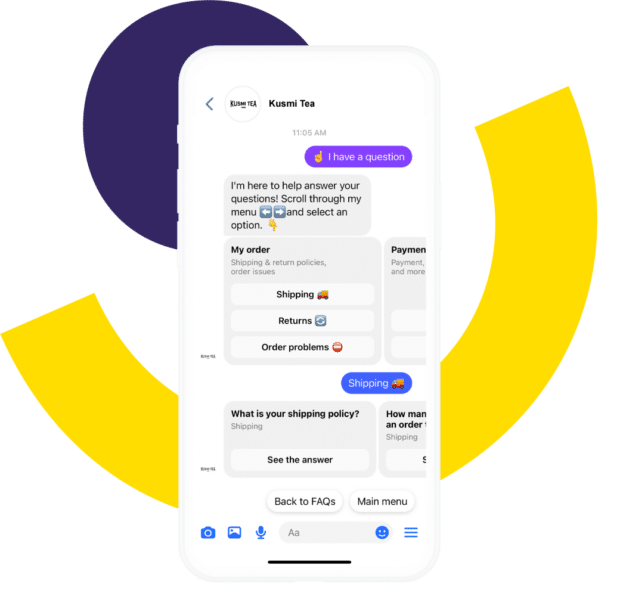
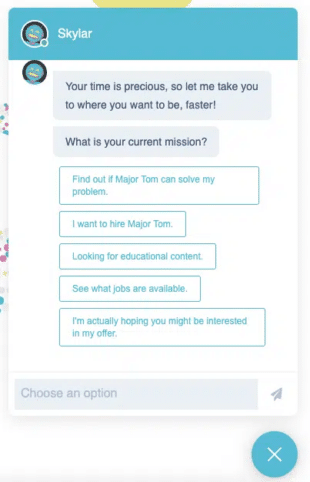

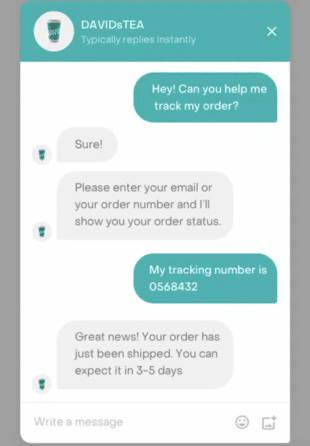
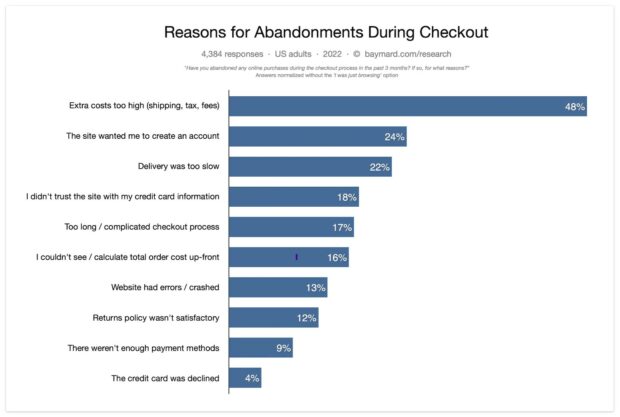

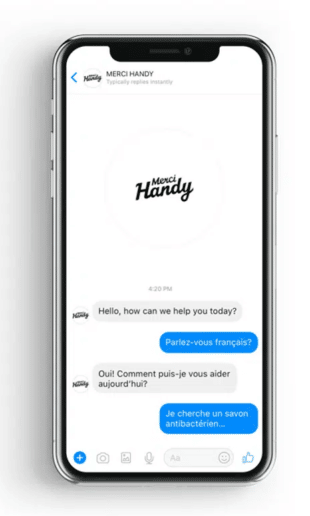
No comments:
Post a Comment